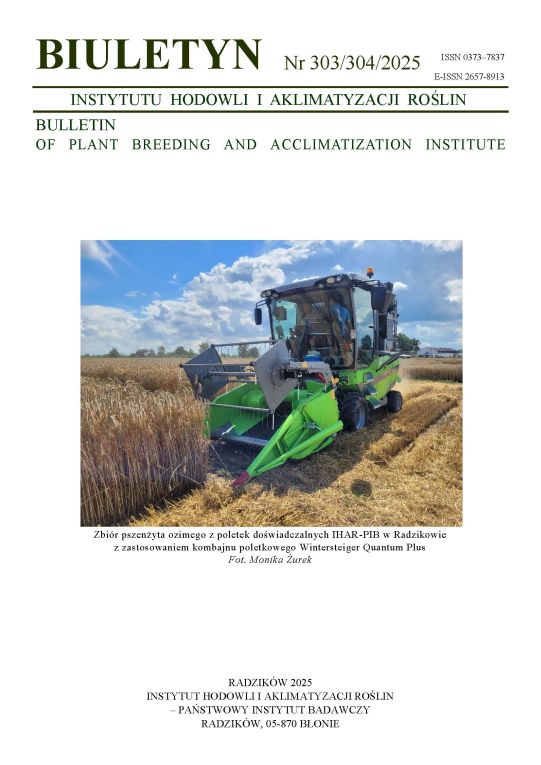Usefulness of winter wheat varieties for cultivation in mixtures
Jadwiga Nadziak
smolice@hrsmolice.plHodowla Roślin Smolice Sp. z o.o. — Grupa IHAR, Oddział Bąków (Poland)
Anna Tratwal
Instytut Ochrony Roślin — PIB, Poznań (Poland)
Abstract
In the study, the usefulness of winter wheat varieties for mixture creation was assessed. The comparative analysis was used for the real and the expected yield in the two-component mixtures and one three-component mixture. Strict field experiments were located in two locations during three vegetation seasons. In the experiment, three winter wheat varieties (Bogatka, Sława, Nutka) were studied, in pure stands and in all possible mixtures combinations. As a result, the influence of particular varieties was assessed in terms of yield obtained from the studied mixtures. On this basis, the most efficient varieties were selected for mixture creation. The variety Bogatka resulted in higher yield obtained from containing it mixtures, which indicates positive effect of this cultivar in mixture cultivation.
Keywords:
mixtures, expected yield, observed yield, winter wheatReferences
Allard R. W., Adams J. 1969. Population studies in predominantly self-pollinating species. XIII. Intergenotypic competition and population structure in barley and wheat. Am. Nat. 103:620 — 645.
Google Scholar
Gacek E., Czembor H. J., Nadziak J. 1997. Zastosowanie mieszanin odmian do poprawy zdrowotności oraz wysokości plonowania pszenicy ozimej. Biul. IHAR 201: 81 — 83.
Google Scholar
Gacek E., Nadziak J. 2000. Zastosowanie mieszanek odmian do poprawy zdrowotności oraz wysokości plonowania jęczmienia jarego. Biul. IHAR 214: 143 — 158.
Google Scholar
Knott E. A., Mundt C. C. 1990. Mixing ability analysis of wheat cultivar mixture under diseased and non-diseased conditions. Theor. Appl. Genet. 80: 313 — 320.
Google Scholar
Trenbath B. R. 1974. Biomass productivity of mixtures. Adv. Agron. 26: 171 — 210.
Google Scholar
Rudnicki F. 1994. Biologiczne aspekty uprawy zbóż w mieszankach. Stan i perspektywy uprawy mieszanek zbożowych. Ogólnopolska Konferencja. Poznań 1994: 7 — 15.
Google Scholar
Tratwal A., Gacek E. 2010. Znaczenie odmian odpornych na choroby i systemów różnicowania upraw w integrowanej ochronie jęczmienia. Integrowana produkcja jęczmienia ozimego i jarego. Poznań 2010. Instytut Ochrony Roślin — PIB: 30 — 34.
Google Scholar
Authors
Jadwiga Nadziaksmolice@hrsmolice.pl
Hodowla Roślin Smolice Sp. z o.o. — Grupa IHAR, Oddział Bąków Poland
Authors
Anna TratwalInstytut Ochrony Roślin — PIB, Poznań Poland
Statistics
Abstract views: 172PDF downloads: 94
License
Copyright (c) 2012 Jadwiga Nadziak, Anna Tratwal

This work is licensed under a Creative Commons Attribution-ShareAlike 4.0 International License.
Upon submitting the article, the Authors grant the Publisher a non-exclusive and free license to use the article for an indefinite period of time throughout the world in the following fields of use:
- Production and reproduction of copies of the article using a specific technique, including printing and digital technology.
- Placing on the market, lending or renting the original or copies of the article.
- Public performance, exhibition, display, reproduction, broadcasting and re-broadcasting, as well as making the article publicly available in such a way that everyone can access it at a place and time of their choice.
- Including the article in a collective work.
- Uploading an article in electronic form to electronic platforms or otherwise introducing an article in electronic form to the Internet or other network.
- Dissemination of the article in electronic form on the Internet or other network, in collective work as well as independently.
- Making the article available in an electronic version in such a way that everyone can access it at a place and time of their choice, in particular via the Internet.
Authors by sending a request for publication:
- They consent to the publication of the article in the journal,
- They agree to give the publication a DOI (Digital Object Identifier),
- They undertake to comply with the publishing house's code of ethics in accordance with the guidelines of the Committee on Publication Ethics (COPE), (http://ihar.edu.pl/biblioteka_i_wydawnictwa.php),
- They consent to the articles being made available in electronic form under the CC BY-SA 4.0 license, in open access,
- They agree to send article metadata to commercial and non-commercial journal indexing databases.
Most read articles by the same author(s)
- Felicyta Walczak, Anna Tratwal, Kamila Rosiak, The influence of winter wheat cultivation in mixtures and pure stands on plant yielding and the occurrence of powdery mildew (Blumeria graminis f. sp. tritici) and cereal pests , Bulletin of Plant Breeding and Acclimatization Institute: No. 253 (2009): Regular issue
- Henryk Bujak, Anna Tratwal, Felicyta Walczak, The reaction of winter triticale varieties, grown using two levels of cultivation intensity, to Wielkopolska environmental conditions , Bulletin of Plant Breeding and Acclimatization Institute: No. 264 (2012): Regular issue
- Maria Surma, Tadeusz Adamski, Andrzej Bichoński, Zdzisław Biliński, Zbigniew Bystry, Piotr Jarosz, Zygmunt Kaczmarek, Anetta Kuczyńska, Karolina Krystkowiak, Wojciech Mikulski, Jadwiga Nadziak, Wanda Orłowska-Job, Zdzisław Paszkiewicz, Michał Rębarz, Anna Sybilska, Phenotypic and genetic divergence of spring barley breeding lines , Bulletin of Plant Breeding and Acclimatization Institute: No. 236 (2005): Regular issue
- Jadwiga Nadziak, Barbara Nowak, Zdzisław R. Biliński, Estimation of variability in agronomic traits of spring barley from the Gene Bank at Radzików , Bulletin of Plant Breeding and Acclimatization Institute: No. 262 (2011): Regular issue
- Jadwiga Nadziak, Zdzisław R. Biliński, Variability of traits in winter barley cultivars collected in the Gene Bank , Bulletin of Plant Breeding and Acclimatization Institute: No. 240/241 (2006): Regular issue
- Anna Tratwal, The effect of growing of winter variety mixtures upon reduction of the incidence of powdery mildew (Blumeria graminis f. sp. hordei) , Bulletin of Plant Breeding and Acclimatization Institute: No. 235 (2005): Regular issue













